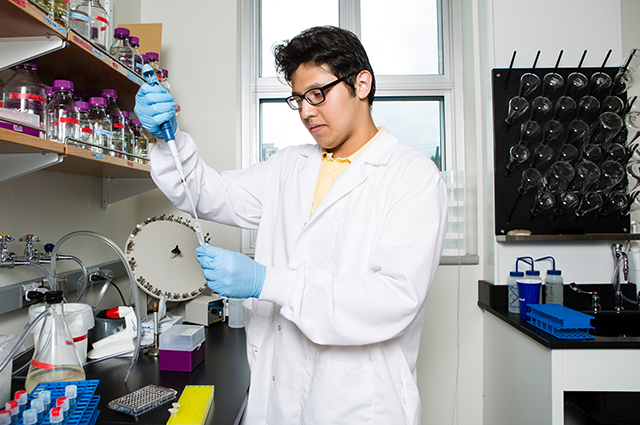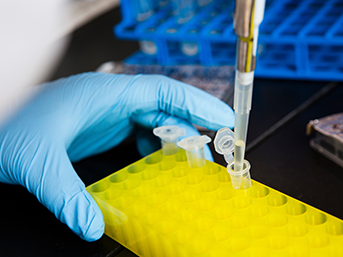Cutting cancer’s conversation short

By Kristin Livingston, A05
The microenvironment of a cancerous tumor is a tricky place. One problem: not all of the elements are bad. Cancerous and noncancerous cells live side by side, communicating extensively—conversations that can determine the fate of the tumor. Cancerous cells try to steer that conversation, in part by secreting enzymes that aren’t supposed to be there.
Greg Berumen, E19, spent his summer tackling those enzymes.
James Van Deventer, an assistant professor in the Department of Chemical and Biological Engineering, runs a lab that’s researching new strategies for discovering highly specific enzyme inhibitors. As a Summer Scholar, Berumen dedicated his summer to supporting this research full-time.
 Berumen prepares samples for an upcoming experiment.
Berumen prepares samples for an upcoming experiment.“It’s really about protein engineering,” Berumen explains. “Designing and testing proteins for unique therapeutic applications.” Currently, there are only two major classes of therapeutics that have been pursued as enzyme inhibitors: biologics such as insulin and small molecule chemicals such as Advil. In Van Deventer’s lab, the strategy is to combine the best parts of those two therapeutic classes to discover highly specific inhibitors. The aim: to create “protein-small molecule hybrids” that serve as robust and specific inhibitors to target enzymes that play crucial roles in tumor progression.
“We’re at the early stages of understanding how this complex environment communicates back and forth,” Berumen says. “How we can leave the normal physiology of each cell alone and focus in on inhibiting the interaction of cancer and non-cancer cells to disrupt growth and progression.” The hope is to have a true impact in understanding cancer biology, as well as aiding in new therapeutic targeting strategies.
“Greg has been fearless in the lab,” Van Deventer says, “working on several important questions related to protein-small molecule hybrid construction and evaluation. Some of his findings are already shaping the directions of our future work in this area.”
What’s a day in the lab like for Berumen? “It’s a lot of yeast!” he says. Also, a lot of time—compared to the academic year. “Working with yeast cells means conducting a lot of time-sensitive experiments, sometimes in parallel. Being a Summer Scholar, I can go in every day and really dedicate myself fully without interruption to this research. It’s incredible.”
Originally from Dallas, Berumen loves being at Tufts—especially in Van Deventer’s lab. “It’s allowed me to think critically in a way that I might not be exposed in the classroom,” he says. And it’s given him a path: graduate school. “I always assumed I’d get a job and go straight into the industry but this research has changed me.”
Like many of us, Berumen has seen loved ones suffer from cancer. “It’s always in the back of my mind, which is why this work is so rewarding. I’m glad to know that what I’m doing could have a broader impact on society socially and scientifically.”
Department:
Chemical and Biological Engineering